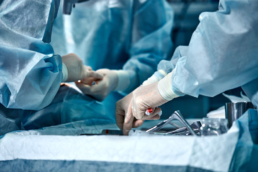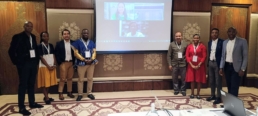SSI Showcase Webinar - Recording Now Available
Recording from the recent online webinar on the 16th January now available to view
Our official Youtube channel has just added the recording from the recent webinar that took place on the 16th Jan. The webinar provides all those working in surgical practice and research with an overview of the ground breaking global research study CheEETAh which provides clear evidence for a simple intervention that reduces surgical site infections.
You can view the webinar recording on the NIHR Global Health Research Unit on Global Surgery channel on Youtube where you can also view the recording with English subtitles. French and Spanish subtitles to be added in the coming days.
You can find out more on the recent webinar by visiting our original news story.
CHEETAH Presented at COSECSA AGM & Conference in Windhoek - Namibia
CHEETAH findings presented to over 100 surgeons at the recent College of Surgeons of East, Central and Southern Africa Conference 2022
Rwanda Deputy Hub Director, Dr. Allen J.C Ingabire who gave the presentation, was quoted as saying "The audience was excited about the findings of our study and ready to implement the recommendations in their respective Hospitals."
The 22nd COSECA Scientific Conference took place in December and was focused on the theme 'Timely Response to Current & Emerging Surgical Challenges on the Continent'.
You can read the recent publications for CHEETAH and SPI here.
You can hear more about the recently published CHEETAH results by joining our upcoming webinar on January 16th here.
CHEETAH and SPI Presentations Win Awards During International Conference in India
CHEETAH and Surgical Preparedness Index findings discussed by Dr. Parvez Haque of the GSU (India Hub) at ASICON 2022 in Mumbai resulted in 1st place (CHEETAH) and 3rd place (SPI) prizes
India Hub Deputy Director, Dr. Haque was quoted as saying "The Cheetah study methodology, study design, results were appreciated and questions about the Global surgery Unit in India and how to connect were the main queries".
During the conference, the president of ASI (Association of Surgeons of India) Dr. G Siddesh made announcements to attendees about research methodology and opportunities to participate in research through the Global surgery Initiative via workshops, modules etc in the year 2023 and future.
The 82nd Annual Conference of the Association of Surgeons of India took place between the 21st and 24th December and is noted as being the second largest association of surgeons in the world.
You can read the recent publications for CHEETAH and SPI here.
You can hear more about the recently published CHEETAH results by joining our upcoming webinar on January 16th here.
NEW Webinar: SSI Showcase 16-Jan-2023
NEW Webinar: Reducing surgical site infections - evidence from global surgical research
When is it?: Monday the 16th of Jan 2023 - 11:00 & 18:00 (GMT) - A 1hr webinar repeated twice during the day.
Who should attend?: Surgeons, surgical researchers, surgical nurses, scrub techs, ODPs and allied healthcare professionals
Hosted by: NIHR Global Health Research Unit Hashtag: #ssi2023
Patient outcomes on a global scale can be significantly improved by reducing surgical site infections (SSIs). A global collaboration of surgical researchers funded by the NIHR have undertaken high quality research implementing simple cost-effective interventions which reduce the number of surgical site infections. This research has been recently published in the Lancet on the 31st October 2022 which provides clear evidence for implementing simple changes in surgical practice to reduce SSIs.
This online webinar chaired by Prof. Dion Morton will provide all those working in surgical practice and research with an overview of the ground breaking global research study CheEETAh which provides clear evidence for a simple intervention that reduces surgical site infections.
The main session will include two key presentations on (1) surgical site infections and (2) the results of the CheEETAh study.
The format of the event includes a panel presentation of global experts discussing how the research was conducted, how the data was collected and analysed and what the results showed. There will be breakout sessions looking specifically at 4 key perspectives on the research (1) health economists (2) community, engagement and involvement (3) statistics and research design (4) qualitative research. The webinar will conclude with a round table discussion of global experts discussing how these results can be implemented across the globe.
View the full details of the webinar and the outline programme
Register now to attend this ground breaking event
Register for the 11:00AM (UK GMT) session using this form.
Or the 6:00PM (UK GMT) session using this form.
General event inquiries, contact e-mail: E.Bywater@bham.ac.uk
GSU at HSR 2022- Keynote Presentations and Panel Discussion
Watch the full workshop delivered by the GSU during the Unit's recent visit to the Seventh Health Systems Global Symposium in Bogota, Colombia
NIHR Global Health Research Unit on Global Surgery Co-Director, Professor Dion Morton was joined by several colleagues from across the Unit to deliver a workshop during the recent symposium, focusing on addressing challenges of delivering effective surgery care through health systems policy research.
During the hour long session, Professor Morton was joined by Dr. Abdul Ghaffar of the World Health Organisation, in addition to Dr. James Glasbey, who discussed the recently published Surgery Preparedness Index. Following this, colleagues from across the organisation, including Dr. Antonio Ramos - De la Medina (Mexico Hub Director) and Adesoji Ademuyiwa (Nigeria Hub Director) formed discussion panels, where various questions from colleagues in attendance were also answered.
A recording of the workshop, including presentations and panel discussion can be accessed here.
You can also access the results of the first ever HPSR report that gives insight into the development and evolution of HPSR in LMICs, and advocates for greater investments in HPSR at country-level.
CHEETAH Discussed on the BBC
Lead NIHR Clinician Scientist for the Global Health Research Unit on Global Surgery discusses new evidence from recently completed CHEETAH trial
As part of the ongoing promotion for the recently completed CHEETAH trial, Co-Author Aneel Bhangu joined the BBC recently to discuss various aspects of the trial such as why the seemingly simple procedure of using surgical gloves during operations has been proven to dramatically reduce mortality rates through infection across Low- and Middle-Income Countries (LMICs).
The recording below gives further insight into the reasoning behind the GSU's undertaking of this global trial and the next steps for the dissemination of the trial results, including how the team plan to use the results to help change surgical policy on a global scale.
Aneel Bhangu joins the BBC live on the 23rd November 2022.
COVIDSurg Surgical Preparedness Index (SPI) webinar
Discussion on how the new SPI tool can help reduce elective surgery cancellations this winter
Thank you to every who contributed to the Surgical Preparedness Index (SPI) study, which assessed hospitals and surgical volume for over 1600 centres in 119 countries. Congratulations to the network on the recent publication of this work in The Lancet.
We are delighted to announce our network CovidSurg webinar in our IRCAD/Medtronic series, where we will discuss how the SPI tool can now be applied to your hospital.
Join us as we dig deeper to explore:
- Why every surgeon and anaesthetist should care about surgical preparedness?
- How and when should I measure the SPI in my hospital?
- How can the SPI be implemented to reduce cancellations of planned surgery?
- Who else needs to be involved to maximise impact?
- Which hospitals and settings could benefit the most?
This will be a unique, first global discussion of the SPI data and its impact on practice from a multidisciplinary panel - don't miss it!
The webinar will be on Monday 28th November 2022
Time: 1900 BST (UK) | 1100 Los Angeles | 1400 New York | 1500 Brasilia | 2000 CET | 2100 Riyadh
You can register for the webinar here.
GSU India Prioritisation Event - an overview of CEI training in Ludhiana
GSU Community Engagement and Involvement (CEI) training and consultation session at CMC Ludhiana, India
The NIHR Global Health Research Unit on Global Surgery (GSU) recently held its first international prioritisation event since the beginning of the pandemic in India, with various meetings taking place in New Delhi, Ludhiana and Kolkata.
Our first overview of the activities that took place focuses on the CEI training session and public consultation at Christian Medical College Ludhiana, India on 29th September 2022.
The training was attended by surgeons, medical students and community health workers with the aim of teaching the fundamentals of CEI and its implementation in research. CEI is a way of collaboratively working with communities who are most likely affected by research outcomes. This includes getting the perspectives of patient, carers and community leaders about the acceptability of a study and strategies to implementing and disseminating findings of completed research.
Following the training, patients and carers joined the group for a consultation on the acceptability of TIGER- a proposed trial that aims to increase access to inguinal hernia surgeries among patients in low and middle-income countries. GSU had done initial work with patients in Ghana but wanted to find out TIGER’s acceptability in the Punjab region.
CEI is an important priority of the Unit and is integrated in all stages of the research it leads. On the 27th of September, leads from GSU Hubs attended a meeting in New Delhi to discuss, among other things, future directions for CEI including a community co-developed patient survey on surgical site infections.
Two new GSU papers in The Lancet will help guide future surgical procedures globally
The Lancet recently published two papers from the completed ChEETAh trial that will help provide safer surgery for elective waiting lists on a global scale
The NIHR Global Health Research Unit on Global Surgery (GSU) team responsible for the completion of the recent ground-breaking ChEETAh trial have unveiled their findings through two recent publications in The Lancet that will benefit elective patients across the globe, particularly surgical patients in Low - and Middle - income Countries (LMIC).
The research team behind the trial found that the routine changing of gloves and instruments just before closing wounds could significantly reduce Surgical Site Infection (SSI) - a leading cause of postoperative complications that arise during surgery. In addition, a new System Preparedness Index (SPI) toolkit was tested that can make hospitals better prepared for various scenarios that could negatively impact on surgical procedures such as pandemics and natural disasters.
You can view the official press release here.
You can also view the trial page here.
GSU at HSR 2022- Global Symposium in Bogota, Colombia
Health Systems Global - GSU feature in the line-up for the Seventh Global Symposium in Bogota, Colombia
The Seventh Global Symposium on Health Systems Research (HSR2022) will take place in Bogota, Colombia from October 31 – November 4, 2022, bringing together approximately 2,000 health systems researchers, policymakers and practitioners from around the world. HSR 2022. will be a hybrid event.
Date: Monday October 31st - Friday 4th November 2022
The NIHR Global Health Research Unit on Global Surgery will be orchestrating the following workshop during the event:
'Addressing the challenges of delivering effective surgery care throughout health policy and systems research'
Date: Tuesday 1st November
Time: 12:30 - 16:00 (COT) 17:30 - 21:00 (GMT)
You can view the agenda here.
Online registration for the Symposium can be done here. Deadline for registration is Sunday 30th October.








